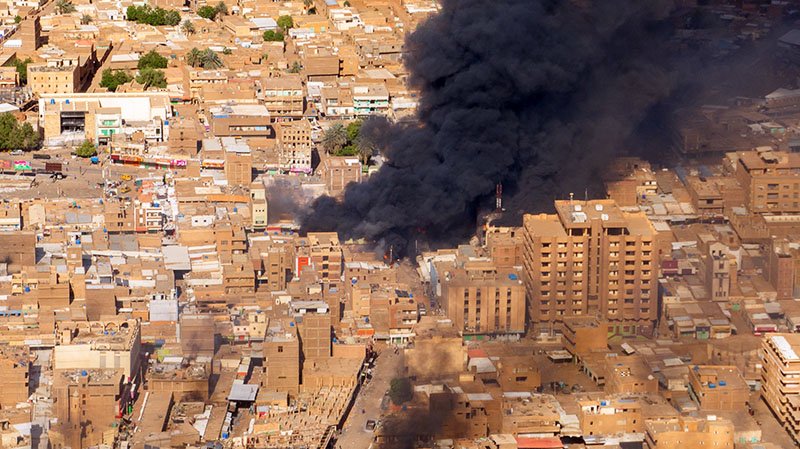The Sudan War: Saudi, Egyptian, and (Libyan-Turkish) Initiatives in a Quest for Solution

Al-Qadarif – Talal Ismail – Al-Mohagig
Several initiatives from neighbouring countries of Sudan, launched by Saudi Arabia, Egypt, Libya, and Turkey, are seeking to stop the war that broke out in mid-April between the Sudanese army and the Rapid Support Forces militia.
This is in addition to the United Nations’ efforts to stop hostilities during the month of Ramadan as a prelude to resolving the Sudanese crisis.
After the ceasefire in Sudan, these initiatives aim to resume a political process that restores stability to a country that affects all neighbouring countries with its situation.
It is noteworthy that the former ruling National Congress Party during the era of former Sudanese President Omar al-Bashir (1989-2019) openly entered the political process after being banned during the past period until the famous phrase “Except for the National Congress” became a prominent feature in the statements of the Central Council of Freedom and Change.
However, these initiatives and efforts collide with the failure of the militia to implement the Jeddah Agreement and the extent of acceptance by the Central Council of Freedom and Change, which has evolved into a new political alliance led by Abdullah Hamdouk, with the entry of the National Congress Party into the new equation.
Egyptian Initiative
On July 13th, Egyptian President Abdel Fattah El-Sisi launched an initiative to resolve the crisis during Egypt’s hosting of a regional summit for Sudan’s neighbouring countries as part of an initiative to cease fire, open safe corridors, deliver aid, conduct comprehensive dialogue, and establish a mechanism for communication with the Sudanese army and militia.
The neighbouring countries of Sudan affirmed the need for a comprehensive dialogue for all Sudanese parties, indicating full respect for Sudan’s sovereignty and territorial integrity, non-interference in its affairs, and consideration of the current conflict as an internal matter.
In the final statement of the summit of Sudan’s neighbouring countries hosted by Cairo and read by Egyptian President Abdel Fattah El-Sisi, the countries pointed to the launch of a comprehensive dialogue that meets the aspirations of the Sudanese people, noting the formation of a ministerial mechanism on the Sudanese crisis.
Ethiopian Prime Minister Abiy Ahmed’s position after the Egyptian initiative was proposed called for linking it to the regional initiative of the Intergovernmental Authority on Development (IGAD).
However, Sudan froze its activity in IGAD in January, prompting the African Union to form a high-level mechanism to consult with political forces and neighbouring countries of Sudan on ways to launch a comprehensive dialogue.
From Cairo, the most prominent political event in the Sudanese arena emerged when the African mechanism affiliated with the African Union Commission met on Wednesday with representatives of the National Congress Party as part of its efforts for the Sudanese dialogue.
The National Congress Party delegation included Dr. Amira Al-Fadil and Dr. Osama Faisal, the party’s foreign relations official.
These developments come as a delegation from the Coordination of Civil Democratic Forces, “Tagadum”, led by Abdullah Hamdouk, arrived in Cairo on Friday morning for consultations with the Egyptian leadership on efforts to stop the war and end the crisis in Sudan.
The Coordination stated: “The visit comes as part of the efforts made by ‘Tagadum’ to discuss ways to reach a peaceful, negotiated political solution that establishes sustainable peace in Sudan.”
The Sudanese government welcomed the Egyptian initiative at that time.
The Transitional Sovereignty Council said in a statement: “The Sudanese government welcomes the outcomes of the summit of Sudan’s neighbouring countries held in Cairo.”
The council affirmed that “the Sudanese government is keen to work with all parties seeking to stop the war and restore security and stability.”
The council at that time stipulated that this should be “accompanied by a commitment to start a political dialogue immediately after the cessation of hostilities, leading to the formation of a civilian government to lead the country during a transitional period ending with elections in which all Sudanese participate.
The Libyan-Turkish Initiative
Turkey and Libya pushed for an initiative to host talks between the Sudanese army and the Rapid Support Forces militia in Tripoli. According to media reports, Tripoli proposed mediating talks for an immediate ceasefire based on what was agreed upon in Jeddah.
Last week, the capital, Tripoli, witnessed visits from both Abdel Fattah al-Burhan and Mohamed Hamdan Dagalo “Hemeti” at the invitation of the “Temporary National Unity Government” to discuss the possibility of reaching a ceasefire.
Sudan’s Foreign Minister, Ambassador Ali al-Sadiq, announced the agreement to negotiate indirectly with the Rapid Support Forces through Libyan and Turkish mediation. He said, “The negotiations, which we immediately agreed to through the Libyan initiative, are expected to be indirect negotiations through Libyan and Turkish mediation.”
He indicated that “the agreement reached in May 2023 through the Jeddah platform includes the withdrawal of the Rapid Support Forces from civilian homes and government institutions, and the evacuation of the capital Khartoum from all armed elements. However, the Rapid Support Forces have not complied with the provisions of this agreement.”
Jeddah Platform
On December 3, 2023, the Saudi-American mediation indefinitely suspended the Jeddah negotiations between the Sudanese army and the militia.
The negotiations in Jeddah stumbled after disagreeing on the Sudanese army’s demand for the Rapid Support Forces to withdraw from civilian areas and end military presence on roads and cities, a demand rejected by the Rapid Support Forces negotiators who insisted on maintaining checkpoints in their controlled areas in the capital Khartoum.
Since that date, the Jeddah Agreement has been pending implementation.
United Nations Intervention
Efforts from neighbouring countries of Sudan were followed by calls from the United Nations to stop the war.
During a Security Council meeting on Thursday, UN Secretary-General Antonio Guterres called for an immediate cessation of hostilities in Sudan. He said, “Combat operations must stop immediately. We need joint efforts for peace. I call on the conflicting parties and Generals Abdel Fattah al-Burhan and Mohamed Hamdan Dagalo, as well as the Sudanese Armed Forces and the Rapid Support Forces, to cease fire.”
The Secretary-General called on “all active parties in the conflict to respect the ceasefire during the month of Ramadan.” He continued, “It is time to silence the guns and raise the voice for peace.”
Sudan’s Ambassador to the United Nations, Al-Harith Idris Al-Harith, stated during his speech at the Security Council meeting that he had received a message from the Chairman of the Sovereignty Council, Abdel Fattah Al-Burhan, welcoming the Secretary-General’s call for a ceasefire by Ramadan.
However, according to the Sudanese ambassador, Al-Burhan asked the Secretary-General about “how to implement the ceasefire while the Rapid Support Forces are still present in homes and continue their successive attacks on citizens in the Jazeera state.”
The Sudanese ambassador said, “Anyone who wants to implement this call must devise a mechanism for it, and Sudan will welcome it.





